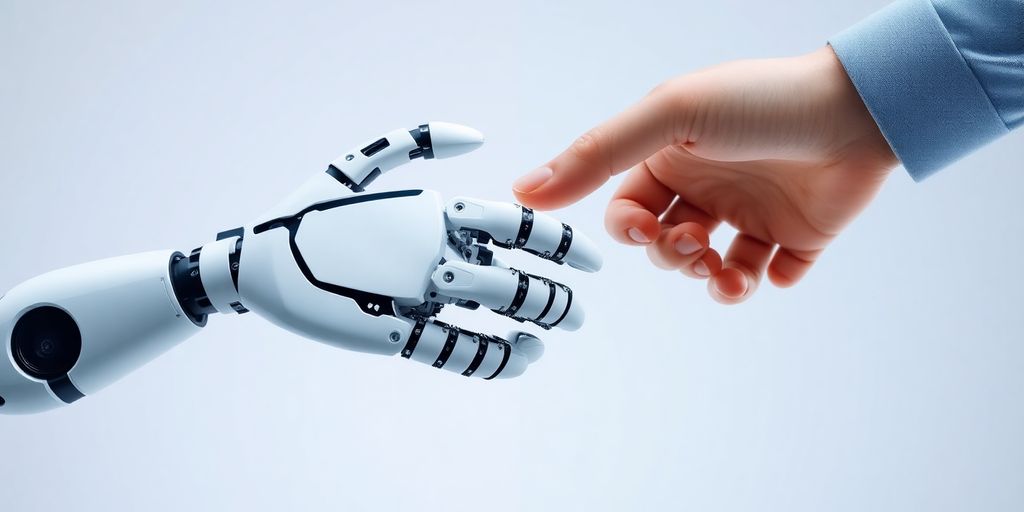In today's fast-paced business world, customer service is super important. Companies are always trying to find better ways to work and connect with people. This has made virtual receptionists a real option to think about, especially when you compare them to the usual human receptionists. We're going to look at what makes them different, what's good about each, and what's tough about them. This should help you figure out what's best for your customer service needs.
The receptionist's job has really changed over the years. It used to be mostly about greeting people and answering phones, kind of like a gatekeeper. But now, it's a lot more. Receptionists are often the first point of contact for customers and visitors, and they do much more than just direct calls. They handle scheduling, manage inquiries, and sometimes even help with basic problem-solving. It’s become a role that needs a mix of organizational skills and good people skills.
Technology has definitely shaken things up at the front desk. Think about it: automated phone systems, chatbots on websites, and online scheduling tools are now common. These tools can handle a lot of the routine tasks that receptionists used to do. This means the job isn't just about answering phones anymore; it's also about managing and working with these new technologies. It's a big shift from the old days.
And then there's the whole AI thing. Virtual receptionists and AI assistants are popping up everywhere. They can answer calls 24/7, handle high volumes of inquiries, and even book appointments. This technology is changing how businesses interact with their customers, making things faster and, for some tasks, more efficient. It's making us all think about what the future of the front desk looks like.

AI receptionists are really changing the game for how businesses handle customer contact. They're not just answering phones anymore; they're becoming a core part of how companies operate. Think about it – they can be on the job all day and all night, which is something a human receptionist just can't do without breaks or overtime pay. This constant availability means customers can get help whenever they need it, no matter the time zone or if it's a holiday.
One of the biggest draws of AI receptionists is their ability to work around the clock. This means your business is always represented, and customers can always get an answer or have their query logged. It’s like having a receptionist who never sleeps, which is pretty neat for customer satisfaction, especially if you have clients in different parts of the world or customers who work odd hours.
When your business gets swamped with calls, AI receptionists really shine. They can manage a huge number of calls at the same time without getting flustered or making anyone wait too long. This is a big plus for businesses that experience busy periods or have a large customer base. It helps keep things running smoothly and stops customers from getting frustrated by long hold times.
Beyond just answering calls, AI receptionists can handle a lot of routine tasks. This includes things like scheduling appointments, taking messages, and even answering frequently asked questions. By automating these jobs, businesses can cut down on the need for as many human staff members, which saves money on salaries, training, and benefits. It frees up human employees to focus on more complex or personal tasks that really need a human touch.
AI receptionists are becoming more sophisticated, learning to understand and respond to a wider range of inquiries in a more natural way. This makes them a practical tool for many businesses looking to improve efficiency and customer service.
Look, AI can be programmed to sound friendly, and it can follow scripts to answer questions. But when someone is really upset, or confused, or just needs a moment of genuine understanding, that's where humans shine. A human receptionist can pick up on tone of voice, subtle cues, and respond with real empathy. They can offer a reassuring word or a moment of patience that an AI just can't replicate. It’s about feeling what the other person is feeling and responding in a way that makes them feel heard and cared for. This isn't just about being polite; it's about making a real connection.
Sometimes, a visitor or caller has a problem that isn't straightforward. Maybe it involves a personal issue, a complaint that needs careful handling, or a situation that requires a bit of common sense and judgment. AI systems are built on rules and data. They struggle when faced with something outside their programming. A human receptionist, on the other hand, can think on their feet. They can adapt to unexpected circumstances, use their own judgment, and find solutions that might not be in any manual. This flexibility is super important, especially in fields like healthcare or law where privacy and sensitivity are key.
Think about your favorite coffee shop or hotel. Often, it's the people who make you want to come back, right? Human receptionists are often the first and last point of contact. They have the ability to remember names, ask about someone's day, or recall a previous conversation. These small interactions build trust and loyalty over time. They turn a simple transaction into a relationship. While AI can provide information quickly, it can't create that personal bond that makes customers feel like valued individuals, not just another number in a system.
When we look at how AI voice receptionists and human receptionists do their jobs, it's clear they have different strengths and weaknesses. It’s not really about one being better than the other, but more about what fits a business's needs best.
Human receptionists naturally bring a personal touch to interactions. They can read body language, understand tone of voice, and respond with empathy, which often leads to higher customer satisfaction, especially in tricky situations. They can adapt their communication style on the fly to match the customer's mood or needs. This ability to connect on a human level is something AI is still working to replicate. AI receptionists, while getting better at sounding natural, often stick to programmed responses. This can sometimes feel impersonal, and customers needing emotional support or a nuanced conversation might not feel as heard or understood.
When a problem pops up that isn't in the script, human receptionists can think on their feet. They can use common sense, draw on past experiences, and come up with creative solutions. If a customer has a really unusual request or a complex issue, a human can usually figure out a way to help. AI, on the other hand, is great at following rules and procedures. It can quickly access information and execute tasks based on its programming. However, when faced with something completely outside its training data, it might struggle or simply state it cannot help.
Personalization is where humans really shine. A human receptionist might remember a regular client's name or a specific preference, making that client feel valued. They can tailor their approach based on a relationship built over time. AI can personalize interactions by using customer data, like calling someone by name or referencing past appointments. But this personalization is based on data and algorithms, not genuine memory or relationship building. It’s efficient, but it lacks the warmth and spontaneity of a human connection. Think of it like this:
It's a subtle difference, but for many customers, that extra bit of personal engagement makes all the difference in their overall experience.

For companies that need to be reachable at all hours, like emergency services, 24/7 support centers, or global businesses operating across different time zones, AI receptionists are a clear winner. They don't need breaks, sleep, or holidays. This means a customer calling at 3 AM on a Sunday will get the same prompt response as someone calling during peak business hours on a Tuesday. This constant availability can be a significant advantage, especially for businesses where missing a call could mean losing a customer or a critical opportunity.
Think about the sheer volume of repetitive questions a receptionist might handle daily: "What are your business hours?", "How do I get to your office?", "Can I schedule an appointment next Tuesday at 10 AM?". AI is fantastic at handling these predictable, information-based queries. It can access a knowledge base instantly and provide accurate answers without variation. Similarly, AI can manage appointment scheduling with great efficiency, checking availability, booking slots, and sending confirmations, all without human intervention. This frees up human staff for more complex tasks.
When you look at the numbers, especially for businesses with a high volume of incoming calls or inquiries, AI receptionists often present a more budget-friendly solution. Hiring, training, and maintaining a team of human receptionists can be expensive. AI systems, while requiring an initial investment, can handle a massive workload without the ongoing costs associated with salaries, benefits, and office space for multiple employees. This makes them particularly attractive for startups, small to medium-sized businesses, or departments within larger organizations that need to manage resources wisely.
In fields where the customer's feeling and overall experience are paramount, human receptionists truly shine. Think about luxury hotels, high-end spas, or even specialized medical practices. Here, the initial interaction sets the tone for everything that follows. A warm greeting, a genuine smile, and the ability to anticipate needs go a long way. AI can handle bookings and answer basic questions, sure, but it struggles to replicate the nuanced understanding of a guest's mood or the subtle cues that indicate a need for extra attention. It's about making people feel truly welcomed and cared for, not just processed.
Let's be honest, not every customer interaction is straightforward. Sometimes people are upset, confused, or dealing with sensitive personal matters. A human receptionist can offer empathy, patience, and a calm presence that an AI simply can't. They can de-escalate a tense situation, offer a reassuring word, or know when to bring in a manager. This emotional intelligence is a game-changer when dealing with complex problems or when a customer needs more than just information – they need understanding.
Your receptionist is often the very first point of contact a person has with your business. This first impression is incredibly important. A human receptionist can tailor their approach based on the visitor – a potential client might get a different greeting than a delivery person. They can manage the flow of people, ensure a tidy waiting area, and provide a friendly, human face to the organization. This personal touch helps build trust and makes the business feel more approachable and reliable. It’s that human element that can make all the difference in how someone perceives your company from the get-go.

It feels like we're at a bit of a crossroads, doesn't it? We've seen how AI can handle a ton of calls and keep things running smoothly, especially when you need someone available all the time. But then you have those moments where you really need a person, someone who just gets it. That's where the idea of hybrid models comes in, and honestly, it seems like the smartest way forward for most businesses.
Think of it like this: AI receptionists are fantastic for the day-to-day, the routine stuff. They can answer common questions, book appointments, and direct calls without getting tired or needing a coffee break. This frees up the human staff to do what they do best – handle the trickier situations, the ones that need a bit of empathy or a personal touch. So, the AI acts as a really efficient first line of defense, and the human staff step in when things get more complicated or when building a real connection is important.
When you set up AI and human receptionists to work together, it's not just about dividing tasks; it's about creating a system that's better than either could be alone. For example, an AI might gather initial information from a caller, like their name and the reason for their call, and then pass that information along to a human receptionist. This means the human doesn't have to ask those basic questions and can jump right into solving the problem or making the customer feel welcome. It makes the whole process quicker and smoother for everyone involved.
Finding that sweet spot between using technology and keeping things personal is key. You don't want to automate so much that you lose the human element that makes customers feel valued. On the other hand, relying solely on humans can lead to long waits and missed calls. The goal of a hybrid model is to use AI to cover the bases, handle the volume, and be available 24/7, while making sure that when a customer does need to talk to a person, that interaction is meaningful and positive. It's about using technology to support, not replace, the genuine human connection.
It’s a question on a lot of people’s minds, isn’t it? Can these AI voice systems really take over the front desk entirely? Well, it’s not quite that simple. Some jobs are definitely more at risk than others. Think about it: if a business mainly needs someone to answer the phone, route calls, and maybe book basic appointments, an AI can do that pretty well, 24/7. Companies that are mostly virtual or have already put in self-check-in kiosks at their physical locations are prime candidates for this kind of automation.
On the flip side, roles that depend heavily on making people feel welcome and handling tricky situations are much harder for AI to replicate. We’re talking about places where the first impression really matters, like high-end hotels or law firms. AI just can’t quite match the warmth and understanding a human can offer when someone’s stressed or needs a personal touch.
The ability to read between the lines, offer genuine empathy, and build rapport is something AI currently struggles with. These human-centric skills are what keep receptionists valuable in many settings.
It’s important to see the difference between automating specific tasks and replacing an entire job. AI is getting really good at handling repetitive, predictable tasks. This frees up human receptionists to focus on more complex, people-oriented duties. So, while some tasks might be automated, it doesn't always mean the job itself disappears. It might just change.
So, the big question is, how do you stay relevant when AI is getting so good at handling calls and scheduling? It's not about fighting the tech, it's about working with it and focusing on what humans do best. Think of it like this: AI can sort the mail, but you're still the one who makes the office feel welcoming.
This is where you really shine. AI can't do empathy, right? It can't really feel what a frustrated customer is going through or genuinely share in a client's excitement. So, honing those soft skills is key. This means getting better at active listening – really hearing what people are saying, not just processing words. It’s also about improving your problem-solving abilities, especially for those tricky situations that don't fit a script. Think about how you handle unexpected issues or calm down an upset visitor. Those are the skills that keep you indispensable.
Instead of seeing AI as a replacement, think of it as a super-powered assistant. Learning to use AI tools can actually make your job easier and open up new possibilities. For example, AI can handle the bulk of routine appointment scheduling, freeing you up to manage more complex client needs or greet visitors personally. You might learn to manage AI chatbots, update their responses, or use AI-powered systems for visitor check-ins. It’s about becoming the person who oversees and directs the technology, not just the one performing basic tasks.
The receptionist role isn't just static; it's changing. Many people who started as receptionists are moving into roles like Office Managers, Customer Experience Coordinators, or even Virtual Assistants. These new positions often involve using digital tools and AI to improve how a business operates. You don't necessarily need to become a coder, but understanding how these systems work and how to use them effectively can lead to more interesting and better-paying opportunities. It’s about seeing the bigger picture and how your skills can fit into a more tech-integrated workplace.

So, can an AI voice receptionist really step into a human's shoes and do the job? It's a question a lot of businesses are asking right now, and the answer isn't a simple yes or no. AI has gotten pretty good, I mean, really good, at handling a lot of the day-to-day stuff that used to fall on receptionists. Think about answering the phone, routing calls, or even booking appointments. AI can do that 24/7 without needing a coffee break, which is a big deal for efficiency and cost savings, especially for companies that get tons of calls. They don't get tired, they don't have bad days, and they can handle a massive volume of inquiries all at once. It's like having a super-efficient assistant who never sleeps.
But here's the thing: when you walk into a place, or call up, and you're met with a warm greeting, a smile, or someone who can genuinely understand if you're having a rough day? That's where AI still has a long way to go. Humans are amazing at picking up on feelings, de-escalating tense situations, or just making someone feel truly welcome. AI can follow a script, sure, but it can't really feel empathy or build that personal connection that makes a real difference, especially in industries where customer experience is everything. It’s like the difference between a perfectly programmed robot and a friend who’s there for you.
AI receptionists are built for speed and consistency. They excel at tasks that are repetitive and predictable. For example, an AI can answer questions about business hours or direct a call to the correct department with near-perfect accuracy, every single time. They don't get flustered by a busy phone line or a long queue of visitors. Their service delivery is based on programmed logic and data.
Human receptionists, on the other hand, offer a service that's much more fluid and adaptable. They can read body language, understand the tone of a caller's voice, and adjust their approach accordingly. If a visitor seems lost or upset, a human can offer reassurance or assistance beyond what a programmed response can provide. This adaptability is key in handling unexpected situations or complex customer needs.
There are definitely situations where AI voice receptionists shine brighter than their human counterparts. For businesses that need to be available around the clock, like online retailers or tech support services, AI offers constant coverage without the overhead of multiple shifts. Companies dealing with a very high volume of simple, recurring questions – think basic FAQs, appointment confirmations, or status updates – can see significant efficiency gains by using AI. It frees up human staff for more complex tasks. Also, for cost-conscious startups or small businesses, AI can provide a professional front-end presence at a fraction of the cost of hiring a full-time receptionist.
Despite AI's advancements, there are many scenarios where human receptionists are still irreplaceable. Industries that rely heavily on building strong client relationships and providing a high-touch customer experience, such as luxury hotels, law firms, or high-end boutiques, will always benefit from a human touch. When dealing with sensitive issues, emotional conversations, or complex problem-solving that requires nuanced understanding and empathy, humans are far superior. The ability to create a warm, welcoming atmosphere and make a personal connection is something AI currently cannot replicate. It's about the overall feeling a visitor or caller gets, and that often comes down to genuine human interaction.
Wondering if an AI receptionist can handle your calls like a person? It's a great question! These smart systems can answer phones, book meetings, and answer common questions all day and night. They're always available, so you never miss a chance to connect with a customer. Want to see how it works for your business? Visit our website to learn more!
Ultimately, it's not really about AI completely replacing human receptionists. Think of it more as a team-up. AI is fantastic for handling the day-to-day, repetitive stuff – answering common questions, scheduling appointments, and being available 24/7. This frees up human receptionists to focus on what they do best: building relationships, handling tricky situations with empathy, and providing that personal touch that really makes a difference. The best approach for most businesses seems to be a mix of both, using AI for efficiency and humans for that essential connection. As AI keeps getting smarter, the way we use both will just keep changing, but for now, it looks like humans still have a vital role to play.
AI receptionists can handle many calls at once, work all day and night, and do simple tasks like scheduling appointments. This can save businesses money and make sure customers always get an answer.
Human receptionists are great at showing feelings, understanding tricky problems, and making friends with customers. They can make people feel more comfortable and build trust.
AI receptionists are good for businesses that get a lot of calls or need to be available 24/7. They are also helpful for automating simple tasks.
Human receptionists are essential for businesses that focus on making customers feel special, like fancy hotels or law offices. They are also needed for jobs that involve sensitive talks or making a great first impression.
A hybrid approach means using both AI and human receptionists. AI can handle the simple stuff, freeing up humans to deal with more complex or personal customer needs.
Human receptionists can stay valuable by getting better at skills AI can't do, like showing empathy, solving tough problems, and building strong relationships with people.
AI receptionists are good at tasks that are repeated and don't need much thinking. However, they can't fully understand emotions or handle unexpected situations like humans can.
The goal isn't to replace humans entirely, but to find the best mix. AI can handle the busy work, letting humans focus on providing personal care and building connections.
Start your free trial for My AI Front Desk today, it takes minutes to setup!








